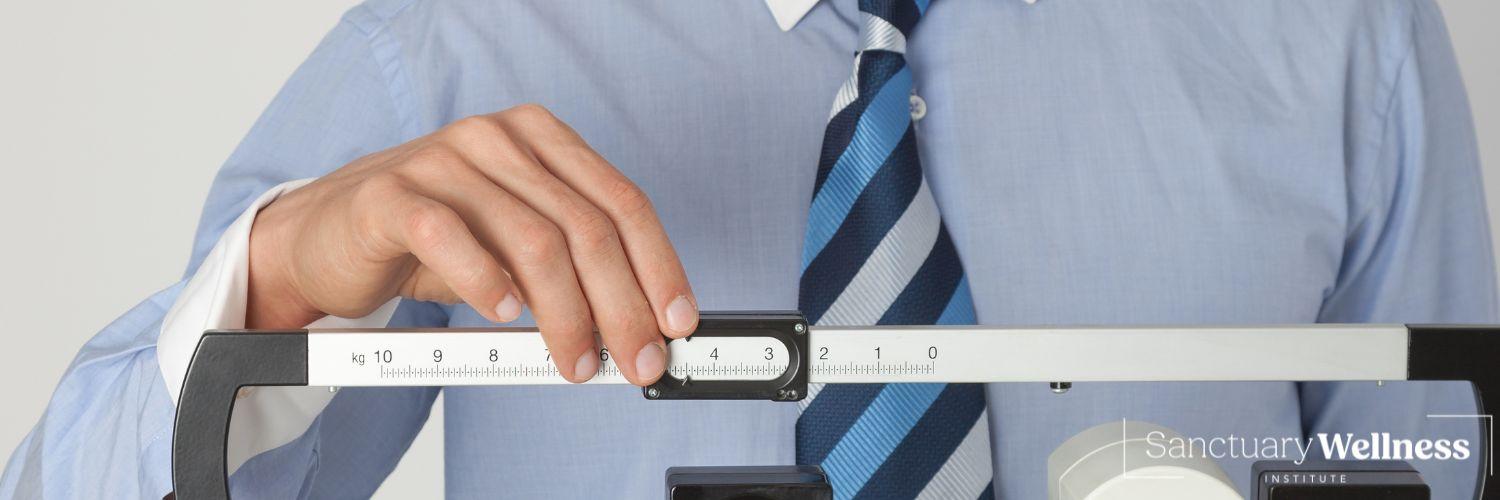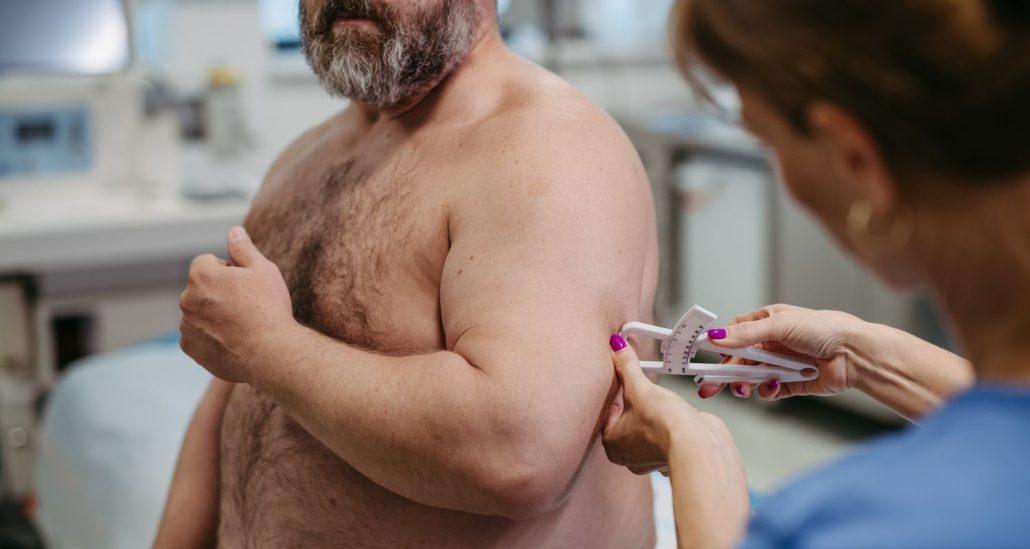- Nicholas DiBella
- Published: December 9, 2024
- Fact-checked by Dr. Desiree Granados

Testosterone has a reputation for transforming body composition—but does it actually make you pack on pounds? This blog will clarify the complex relationship between testosterone levels and weight, examining whether the hormone directly causes weight gain or influences body weight through more subtle metabolic mechanisms. We’ll explore how testosterone impacts muscle mass, fat distribution, and overall body composition, providing insight into the hormone’s true role in weight management.
How Testosterone Levels Impact Weight
Testosterone does not typically make you gain weight. Instead, low testosterone can contribute to weight gain by reducing muscle mass, slowing metabolism, and increasing fat accumulation, while maintaining optimal testosterone levels helps support a leaner body composition and more efficient fat burning.
Testosterone is essential for maintaining a healthy weight, especially in men. It supports the development and retention of lean muscle mass, which is key for a faster metabolism and efficient fat burning. Men with optimal testosterone levels are more likely to have lower body fat percentages compared to those with low testosterone.
Low testosterone can lead to increased fat accumulation, decreased energy levels, and difficulty losing weight, as muscle mass diminishes without adequate hormonal support. Conversely, testosterone replacement therapy is often prescribed to men with low testosterone to help them regain muscle mass and reduce body fat.
Testosterone and Fat Distribution
Testosterone doesn’t just influence weight—it also affects where fat is stored in the body. Men with healthy testosterone levels tend to accumulate less fat around their midsection, while low testosterone can lead to increased abdominal fat. This visceral fat, located around vital organs, is associated with an elevated risk of heart disease, diabetes, and other health issues.
According to a study published in 2018, decreased levels of testosterone are associated with increased visceral fat in the abdominal area. Conversely, when testosterone levels are restored to an optimal range, levels of abdominal fat decrease.
Restoring testosterone levels through therapy or natural methods may help reduce stubborn belly fat. However, it’s important to remember that hormonal balance is just one piece of the puzzle. Combining testosterone optimization with a nutritious diet and regular exercise is the most effective way to improve fat distribution and overall health.
Testosterone and Increased Muscle Mass
One of testosterone’s primary functions is supporting muscle growth and repair. Higher testosterone levels promote protein synthesis, the process by which muscles rebuild and grow stronger after exercise. This makes testosterone essential for maintaining a lean, toned physique.
Low testosterone, on the other hand, can make it challenging to build and retain muscle. Even with regular exercise, men with low testosterone may struggle to achieve their fitness goals. Testosterone therapy can help reverse these effects, enabling men to build muscle more effectively and improve their body composition.
Additionally, increased muscle mass enhances metabolic health by increasing the body’s resting energy expenditure, making it easier to maintain or lose weight. This is why testosterone optimization is often a key component of weight management strategies for men with hormonal imbalances.

Signs Your Weight Gain Might Be Hormone-Related
While weight gain is often linked to diet and activity levels, it can also signal an underlying hormonal issue. Signs that your weight gain might be related to testosterone or other hormones include:
- Increased belly fat: Excess fat around the midsection is a common symptom of low testosterone.
- Fatigue: Low energy levels can reduce physical activity, contributing to weight gain.
- Loss of muscle mass: Difficulty building or maintaining muscle despite exercising.
- Mood changes: Irritability, depression, or decreased motivation can accompany low testosterone.
- Reduced libido: A decreased sex drive is another common sign of hormonal imbalance.
If you’re experiencing these symptoms alongside unexplained weight gain, it’s important to consult a healthcare professional. They can assess your hormone levels and recommend treatment options, such as testosterone replacement therapy, to address the root cause of your weight challenges.
Testosterone and Weight Loss
Testosterone can actually support weight loss. It does so through three primary mechanisms:
- Metabolic Boost: Increased muscle mass raises resting metabolic rate, burning 6-10 additional calories per pound of muscle daily.
- Enhanced Fat Burning: Optimal testosterone levels improve the body’s ability to break down visceral fat stores.
- Exercise Performance: Higher testosterone increases energy and motivation, making it easier to maintain an active lifestyle and consistent workout routine.
How long does it take to lose weight on testosterone? Results can vary depending on individual factors such as diet, exercise, and starting testosterone levels. Many men begin to notice changes within three to six months of starting testosterone replacement therapy, but significant weight loss often requires a comprehensive lifestyle approach.
How to Know if TRT Is Right for Me
Testosterone replacement therapy (TRT) can be life-changing for men experiencing the effects of low testosterone, but it’s not the right solution for everyone. Deciding whether TRT is suitable for you involves evaluating your symptoms, lifestyle, and medical history.
Here are some key factors to consider:
- Persistent Symptoms of Low Testosterone: If you’re experiencing signs like unexplained weight gain, reduced energy, loss of muscle mass, or low libido despite a healthy lifestyle, it may be worth checking your testosterone levels.
- Confirmed Low Testosterone Levels: A simple blood test performed by a healthcare provider can confirm whether your testosterone levels are below the normal range.
- Underlying Health Conditions: Certain medical conditions, such as sleep apnea or prostate issues, may need to be addressed before starting TRT.
- Commitment to Monitoring: TRT requires regular follow-ups to monitor testosterone levels, side effects, and overall health.
- Lifestyle Alignment: While TRT can be effective, it works best when combined with a healthy diet, regular exercise, and other positive lifestyle changes.
Consulting a qualified healthcare provider is essential to determine if TRT is the right option for you. They can assess your symptoms, run necessary tests, and help you weigh the benefits and risks based on your individual needs.
Conclusion
Testosterone plays a significant role in weight management by supporting muscle growth, regulating fat distribution, and boosting metabolism. While low testosterone can contribute to weight gain, restoring hormonal balance through therapy or lifestyle changes can help improve body composition and overall health.
If you suspect your weight gain is hormone-related, seeking medical advice is essential. The Sanctuary Wellness Institute offers comprehensive testosterone replacement therapy (TRT) services designed to help men address the symptoms of low testosterone.
Our experienced healthcare professionals provide personalized care, ensuring that your treatment plan is tailored to your specific needs and goals. With the right approach, you can achieve a healthier weight, better energy levels, and improved overall well-being.
How we reviewed this article:
- J Grant Mouser, Paul D Loprinzi, Jeremy P Loenneke (2016). The association between physiologic testosterone levels, lean mass, and fat mass in a nationally representative sample of men in the United States
https://pubmed.ncbi.nlm.nih.gov/27543675/ - Hailu Ma, Juan Sun, Xueyan Wu, Jiangfeng Mao, Qin Han (2024). Percent body fat was negatively correlated with Testosterone levels in male
https://pmc.ncbi.nlm.nih.gov/articles/PMC10763932/ - Aaron P Frank, Roberta de Souza Santos, Biff F Palmer, Deborah J Clegg (2018). Determinants of body fat distribution in humans may provide insight about obesity-related health risks
https://pmc.ncbi.nlm.nih.gov/articles/PMC6795075/ - R C Griggs, W Kingston, R F Jozefowicz, B E Herr, G Forbes, D Halliday (1989). Effect of testosterone on muscle mass and muscle protein synthesis
https://pubmed.ncbi.nlm.nih.gov/2917954/ - Omeed Sizar; Stephen W. Leslie; Janice Schwartz (2024). Male Hypogonadism
https://www.ncbi.nlm.nih.gov/books/NBK532933/
Current Version
December 09, 2024
Written By
Nicholas DiBella
Fact-checked By
Dr. Desiree Granados
Editorial Process
Our Editorial Process

Nicholas DiBella received his psychology degree from West Chester University of Pennsylvania and has been writing content for the Sanctuary Wellness Institute since 2023. He is passionate about all things health & wellness.







